Ceramics Bachelor’s Program
Through challenging assignments, critiques, lectures, demonstrations, fieldtrips and one-on-one conversations, students in our Ceramics BFA program discover individual artistic strengths, develop a personal voice and express a range of experiences.
Curriculum
Sophomores are introduced to sculpture and pottery through the processes of throwing, hand-building, mold-making, glazing and firing. Technique is integrated with ideas, aesthetics and personal expression in the context of contemporary and historical ceramic practice. Juniors move beyond the studio and into the world through commissions and community-engaged projects. Digital technology is central in the Materials Research class for clay, glaze and advanced kiln firing approaches.
Learning outcomes
Graduates of the four-year BFA program are prepared to:
- demonstrate proficiency in ceramic construction skills (hand-building, slip-casting, mold-making, and wheel-throwing) along with clay and glaze composition and effects of the firing sequence.
- develop work for different contexts, including indoor and outdoor installation, tile-work and tableware for restaurants.
- articulate the effects of ceramics in various environments (gallery, home, restaurant, architectural), including consideration of visual, functional, environmental and political aspects.
- understand the effects of new technologies on the field.
- identify and commit to focused study of a particular field in ceramics, such as sculpture, environmental arts, architecture, pottery or design.
Undergraduate student work

Eli Tegu BFA 2015
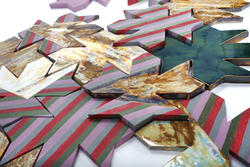
Ruby Hsu BFA 2016
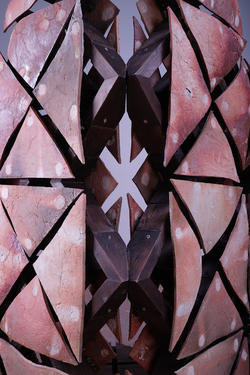
Kaitlyn Cirielli BFA 2019
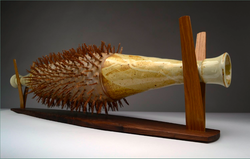
Sean Garrett BFA 2018
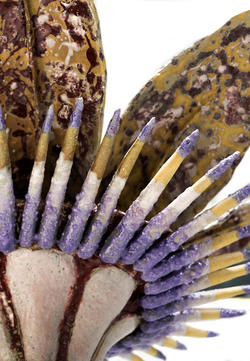
Jasper Isaac Johns BFA 2020
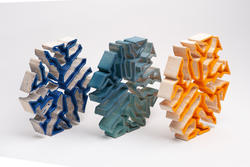
Wei Zhang BFA 2021
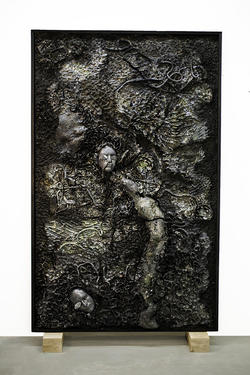
Niko Kanamoto BFA 2020
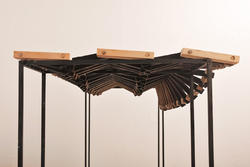
Wei Zhang BFA 2021
Inspiring community
A small department of around 10 undergraduates and 10 grad students, Ceramics offers strong individual support from faculty mentors. Every year a wide range of professionals in the field visit to offer demonstrations and workshops, along with critical feedback and new perspectives.
Learning environment
Ceramics majors work in private and communal workspaces on the third floor of RISD's Metcalf Building, where the studio environment fosters a ready exchange of ideas among both undergraduate and graduate students. The department also supports an outward focus through everything from its relationship with the Providence-based industrial art nonprofit The Steel Yard to studios designed to connect students with members of the off-campus community.
Ceramics majors often work on interdisciplinary projects with Architecture and Interior Architecture classes, install site-specific installations for various locations on campus and in the city, and design and fabricate tableware to complement a specific restaurant's cuisine and décor.
Thesis project
During senior year, students create an independent body of work, supported by individual tutorials with faculty, group critiques and discussions. Professional practice is emphasized, with coaching on presentation skills, documentation, marketing, exhibitions and residencies.
Application requirements
Common Application
You’ll begin and manage your RISD application process by completing the Common Application. There is a nonrefundable application fee
Fee waiver
We want to make sure that application fees do not pose a barrier for any student. If you meet certain qualifications, you can request a Common Application fee waiver in one of the following two ways:
- Navigate to the "Fee Waiver" portion on the Common Application and select the option that most fits your family circumstances. This will allow you to submit your application without entering credit card information.
- If your situation does not match any of the Common Application’s waiver criteria, email admissions@risd.edu and we’ll process the waiver manually.
To receive a SlideRoom fee waiver, please email admissions@risd.edu.
Academic transcripts
Applicants must provide official transcripts of all secondary academic work through the most recent grading period. Your counselor may submit your transcript through the Common Application, Parchment, email or mail.
If your academic credentials are not written in English, they must be translated into English by an approved translator prior to submission.
Tests and test-optional
Test-Optional, SAT and ACT
We offer all applicants (domestic and international) the option to apply without submitting results from the SAT or ACT. You may opt into this process by selecting “test-optional” under the "Testing" portion of your RISD Common Application.
For students who choose to submit test scores, we will superscore your results, looking at your highest outcome across multiple test dates.
RISD’s institution code number for the SAT is 3726; for ACT the code number is 003812.
Transfer credits
You can use some Advanced Placement (AP), A-Level classes and International Baccalaureate (IB) credits toward RISD liberal arts requirements. First-year students can transfer a maximum of nine credits from AP courses with a score of 4 or 5, A-Level classes with an earned grade of C or higher or Higher Level IB scores of 5, 6 or 7. We will not accept AP or IB credit from art or studio classes.
VIEW OUR FULL TRANSFER CREDIT POLICY
English language proficiency tests
All applicants who speak English as a second language, including US citizens, must submit results from any one of these three options:
- TOEFL (Test of English as a Foreign Language)
- IELTS (International English Language Testing System)
- Duolingo (an online English test).
Since English proficiency is a prerequisite for acceptance, applicants are required to meet a minimum score of at least 93 on the TOEFL, a 7 on the IELTS or a 120 on Duolingo.
Plan to take the TOEFL or IELTS well in advance of the application deadline since it may take three weeks for your scores to be sent to RISD by the test agency. It may take up to four days for us to receive Duolingo test results.
The language test requirement may be waived for applicants who have completed their secondary education in an institution where English is the language of instruction. In addition, applicants must have three consecutive, full-time years of instruction without ESL, ELL or ENL courses. A waiver form can be found in the applicant portal and you can email the Admissions Office at admissions@risd.edu with any questions.
Portfolio
Portfolio submission
Your portfolio should present 12–20 examples of your most recent work showcasing your thinking and making. Once you've started your RISD application in the Common Application, you will be directed to the online platform SlideRoom to upload your portfolio.
What to include
The work you select should reflect a full range of your ideas, curiosity, experimentation and experience in creating and making. This can include work in any medium, in finished or sketch form, and can be the result of an assigned project or a self-directed exploration.
We strongly recommend that you include some examples that involve drawing and/or painting from direct observation (rather than from imagination, photograph or video). Since drawing and painting are fundamental tools for visual makers from initial concept to execution, it is valuable for reviewers to see examples of your experience with and approach to drawing.
While the majority of your portfolio should feature finished pieces, we suggest including some research or preparatory work in up to three—but no more than three—portfolio uploads/slides. This helps reviewers better understand how you develop your ideas.
Authenticity and documentation
The authenticity of the work in your portfolio is of great importance to the Admissions Committee. We will ask you to acknowledge that the work in your portfolio was conceptualized and created by you. In the case of collaborative work, we ask that you document your contributions and credit additional artists using the Additional Details field in SlideRoom.
We strongly discourage including excessive visual elements and text descriptions in a single slide submission. These are difficult to view and are likely to exceed the allowed submission limit.
You can submit additional angles or detail shots of some works across multiple slide submissions, combined into one composite including no more than three images, or in a single video upload. Editing is an important part of curating your portfolio. You may need to devise creative solutions to best show your work within the limits of submission guidelines.
We recommend the following file formats: jpeg, png, gif, mp4 and mov. These formats are most compatible with SlideRoom. We discourage Google Drive and zipped files.
You may be interested in attending or watching the recording of one of our portfolio tips webinars for more advice on how to approach your RISD application portfolio.
Artificial intelligence (AI)
RISD embraces the ethical use of artificial intelligence (AI) in the creative process. It is, however, important for the Admissions Committee to understand how and where AI was used. Any work supported or created by AI in your portfolio must include a description of your process and the tools you used in your making. We will ask you to acknowledge this within Slideroom.
College essay
RISD requires the Common Application personal essay (up to 650 words). You will find the writing prompts in the Writing section of the Common Application.
While we encourage you to adhere to the rules of good writing, we look for applicants who are not afraid to take risks in their expression. Please don't hesitate to use a writing style or method that may be outside the mainstream as you express a distinctive personal position in your essay.
Letter(s) of recommendation
Letters of recommendation can be very helpful to your application. One letter is required, although you may submit as many as three. Recommendation letters should be written by teachers or other professionals who have firsthand knowledge of your art or academic achievements and can comment on your potential as a student.
Please use the Common Application to invite your recommendation writers to submit letters through that service. Letters may also be emailed to admissions@risd.edu or sent directly to our mailing address (see “Submitting your materials” below).
Transfer applicants
If you are interested in applying to RISD as a transfer student, please see our transfer application guidelines.
Please note that the Painting department is not accepting transfer applications for 2026 entry.